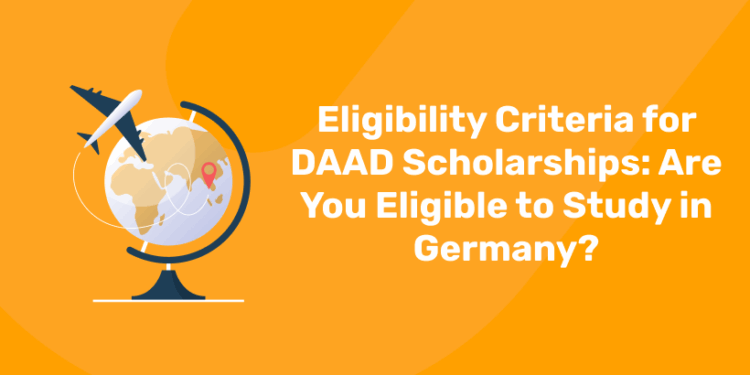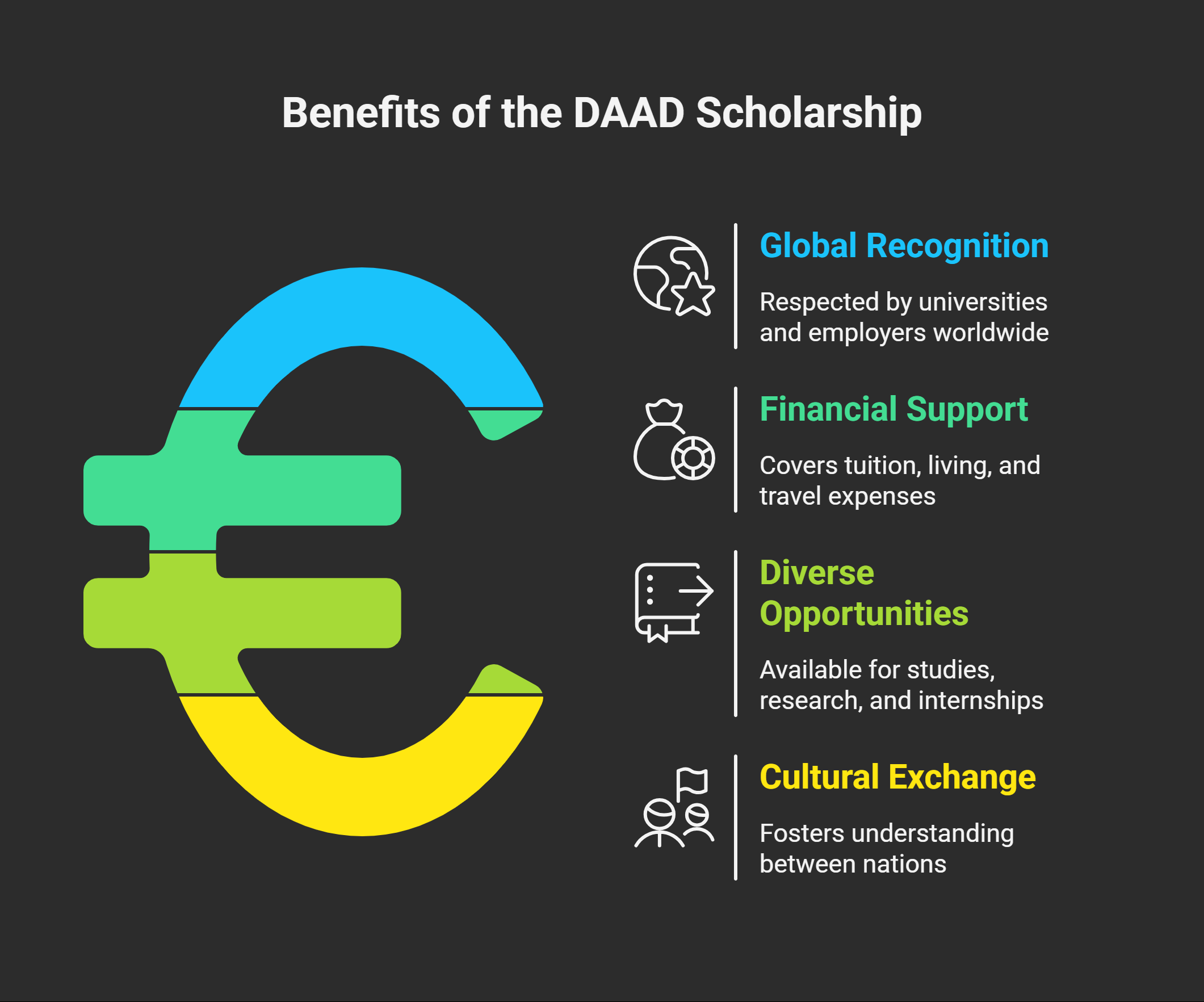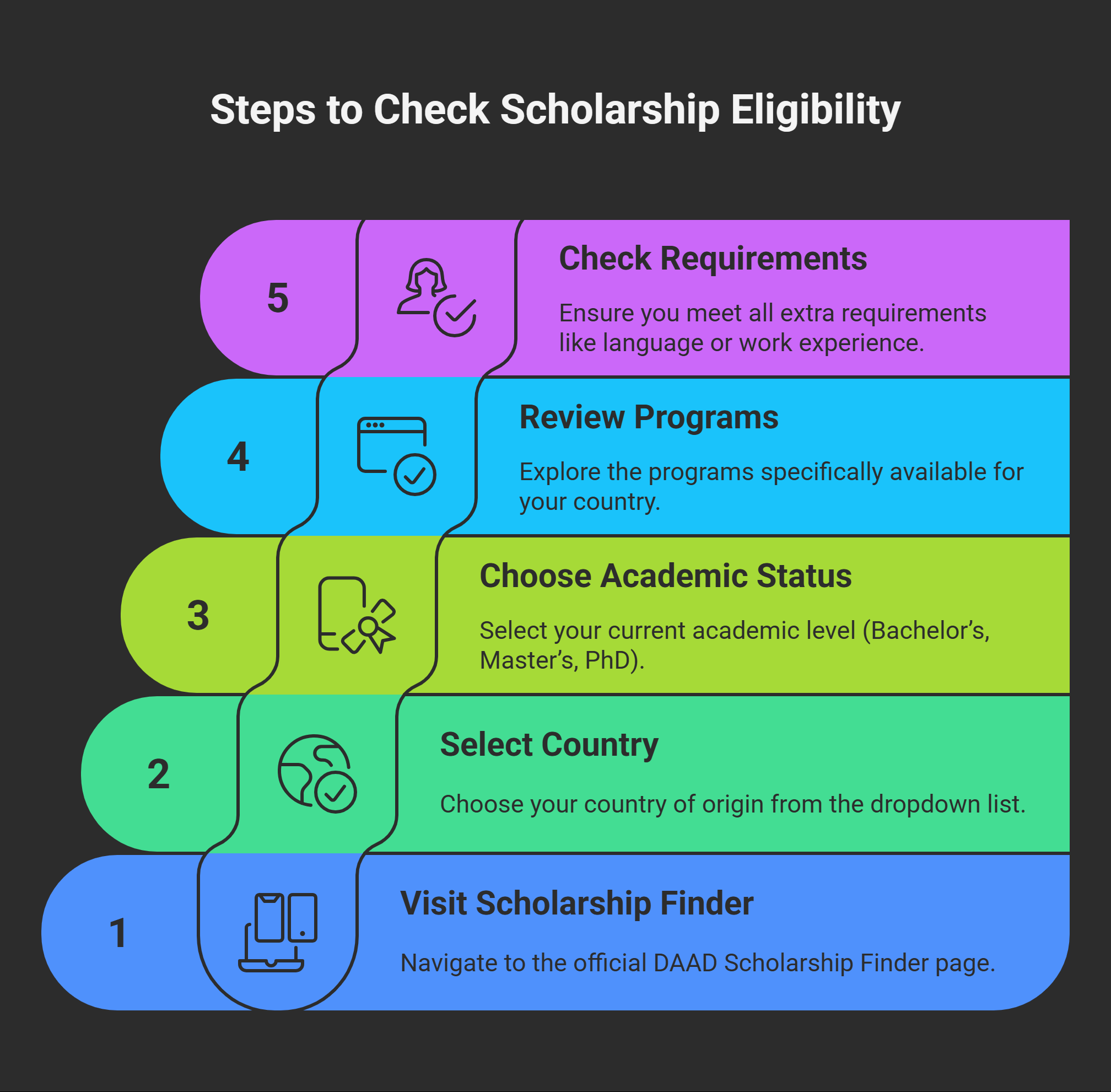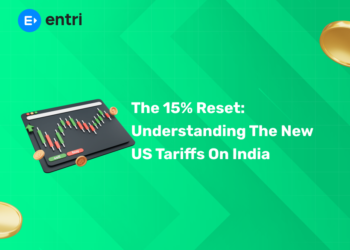Table of Contents
The Eligibility Criteria for DAAD Scholarships can seem confusing. Many students dream of studying in Germany with DAAD help. This scholarship supports talented students from many different countries. It offers funding for studies, research, and internships abroad. Applicants must meet specific academic and language requirements. Work experience is sometimes needed for certain programs. Understanding the rules early makes applying much easier. We will explain them clearly in this guide.
Knowing the criteria helps you save time and effort. It ensures you focus on scholarships you can actually get. Each program type has its own set of requirements. Your country of origin also plays an important role. Language skills in English or German may be necessary. Additional documents like recommendations are often required too. Let’s go through everything step-by-step in this article.
Key Takeaways
-
DAAD supports international students for study, research, and internships.
-
Eligibility criteria vary by degree level and country.
-
Language proficiency in English or German is often required.
-
Work experience may be needed for specific programs.
-
Academic qualifications must match the chosen field of study.
-
Additional documents like motivation letters strengthen applications.
-
Understanding the criteria improves your application success chances.
Master the German Language with Entri App! Click Here for Free Trial Class!
Introduction
The DAAD Scholarship is a prestigious German funding program. It supports international students, graduates, and researchers. The scholarship is funded by the German Academic Exchange Service. DAAD aims to promote academic exchange and global cooperation. It offers opportunities to study, research, or train in Germany. Many recipients continue into global careers after their studies. DAAD strengthens cultural understanding through educational partnerships. It is highly respected in academic and research communities.
|
German A2 Exercises – Download Free PDF |
||
The main goal is to help talented individuals succeed. Scholarships are offered for many academic disciplines and fields. Applicants must meet specific academic and personal requirements. These requirements vary based on program and country. Knowing these rules helps you prepare a strong application. This article will explain DAAD’s eligibility criteria in detail. It will guide you step-by-step through the requirements.
Importance of the DAAD Scholarship
-
Global recognition – respected by universities and employers worldwide.
-
Financial support – covers tuition, living, and travel expenses.
-
Diverse opportunities – available for studies, research, and internships.
-
Cultural exchange – fosters understanding between nations.
Purpose of This Article
| Goal | Description |
|---|---|
| Clarify requirements | Explain who can apply for DAAD funding. |
| Save applicant time | Help avoid applying to ineligible programs. |
| Increase success chances | Guide in preparing strong, complete applications. |
General Eligibility Requirements
1: How do you say "Good Morning" in German?
DAAD scholarships have strict rules for all applicants. These rules make the selection fair and transparent. They focus on education, work experience, and scholarship purpose. Knowing them helps you avoid wasting application time. Requirements can differ by scholarship level and program type. Some programs demand relevant professional or research experience. The scholarship purpose must align with your career plans.
1. Educational Qualifications
You must have the correct academic background. The qualification depends on your desired program level.
-
Bachelor’s level – Rare; usually through special country projects.
-
Master’s level – Requires a recognized undergraduate degree.
-
PhD/Postdoc – Requires a Master’s or strong research degree.
Table – Education Requirements by Program
| Program Level | Minimum Qualification | Special Notes |
|---|---|---|
| Bachelor’s | Completed high school or equivalent | Only in certain partnerships |
| Master’s | Bachelor’s degree in related field | Degree within past six years |
| PhD/Postdoc | Master’s or equivalent research qualification | Strong academic record required |
2. Work Experience (Where Required)
Some DAAD programs require relevant job experience. This is common for career-focused or development programs.
-
Duration – Often two years or more experience.
-
Fields accepted – Industry, academia, or research positions.
-
Proof – Letters from employers or official contracts.
Example: A Master’s in Development Studies may require NGO work.
3. Purpose of DAAD Scholarship
Your application must match DAAD’s program purposes. DAAD supports three main categories of opportunities.
-
Study – Full academic degrees at German institutions.
-
Research – Approved academic or scientific projects.
-
Internships – Practical training linked to your field.
Tip: Always match your purpose to the scholarship description.
|
Goethe 2025 Exam Dates: Multiple Test Centers |
|
| Trivandrum Goethe Exam Dates | Kochi Goethe Exam Dates |
| Chennai Goethe Exam Dates | Coimbatore Goethe Exam Dates |
Free German A1 Mock Tests – Powered by AI!
Test your skills on our interactive platform. Get instant feedback from our AI to help you communicate better and track your progress. Start your free German mock test now.
Test Your German A1 for FreeAcademic Requirements by Program Type
DAAD scholarships have different academic rules for each level. These rules ensure applicants can handle their chosen program. They vary for Bachelor’s, Master’s, and PhD/Postdoc scholarships. Some levels are rarely funded, others are more common. Strong academic performance improves your application success rate. Your degree must match your chosen study or research. Let’s look at the requirements for each level.
1. Bachelor’s Scholarships
Bachelor’s scholarships from DAAD are very rare. They are usually part of special partnership programs. These may involve exchange between German and home universities.
-
Requirement – Completed high school or equivalent qualification.
-
Special condition – Program must be DAAD-approved for undergraduates.
-
Country limitation – Available only to certain nationalities.
Example: An exchange program for engineering students from select countries.
2. Master’s Scholarships
Master’s scholarships are the most common under DAAD. They require a strong academic foundation in your field. Your Bachelor’s degree must be officially recognized.
-
Requirement – Bachelor’s degree in a related subject.
-
Completion rule – Degree completed within last six years.
-
Extra condition – Some programs require job experience.
Example: A Master’s in Public Policy may need government experience.
3. PhD & Postdoc Scholarships
PhD and Postdoc scholarships focus on research excellence. Applicants must show strong academic and research capabilities. A clear research proposal is usually required.
-
Requirement – Master’s degree or equivalent research qualification.
-
Completion rule – Degree within the last six years.
-
Extra condition – Proposal matching German research priorities.
Example: A PhD in Renewable Energy aligned with German projects.
Table – Academic Requirements by Level
| Program Level | Minimum Qualification | Extra Requirements |
|---|---|---|
| Bachelor’s | High school or equivalent | Only for special partnerships |
| Master’s | Bachelor’s in related field | Some need work experience |
| PhD/Postdoc | Master’s or equivalent | Detailed research proposal required |
Country-Specific Eligibility
DAAD scholarships are not the same for every country. Eligibility rules change depending on your nationality and location. Some programs are open to all countries worldwide. Others target specific countries or regions for funding. Your country can affect program type, duration, and benefits. Checking country-specific rules is very important before applying. DAAD provides an official tool to find exact details.
Why Country-Specific Rules Exist
Country-specific rules help DAAD meet its global objectives. They ensure scholarships support both Germany and partner countries. Different nations have different educational and development needs. DAAD designs programs to match these specific national priorities.
-
Development goals – Build skilled professionals in targeted countries.
-
Example: Scholarships in healthcare for developing nations.
-
Example: Engineering programs for infrastructure growth.
-
-
Research cooperation – Strengthen joint academic and scientific projects.
-
Example: Joint research between German and African universities.
-
Example: Shared technology innovation with Asian partners.
-
-
Bilateral agreements – Based on official country partnerships.
-
Example: Education exchange treaties with certain nations.
-
Example: Government agreements for student mobility.
-
Note: These rules help ensure fair resource distribution worldwide.
Examples by Country
DAAD opportunities vary greatly between different home countries. Each country has unique programs, priorities, and requirements. Here are some detailed examples for key nations.
India
India has strong DAAD cooperation for higher education. Many scholarships focus on science, engineering, and social studies. Short-term research stays are also commonly funded.
-
Popular programs – Master’s in engineering, PhD in sciences.
-
Extra requirements – Often two years of work experience.
-
Special benefit – Access to joint Indo-German research networks.
-
Example – DAAD IIT Master’s program for top graduates.
Nigeria
Nigeria receives targeted DAAD support for development-focused fields. STEM subjects and policy-related studies are highly prioritized. English-language programs are widely available for Nigerian students.
-
Popular programs – Master’s in development studies, environmental science.
-
Extra requirements – Excellent academic record and English proficiency.
-
Special benefit – Access to African-German research collaborations.
-
Example – DAAD EPOS scholarship for development professionals.
Brazil
Brazil enjoys strong research and academic exchange with Germany. Many scholarships support science, agriculture, and environmental studies. Joint degree programs are common between universities of both countries.
-
Popular programs – PhD in natural sciences, postdoctoral fellowships.
-
Extra requirements – Advanced English or German skills.
-
Special benefit – Participation in binational research initiatives.
-
Example – CAPES-DAAD program for doctoral researchers.
How to Check Your Country’s Eligibility
-
Go to the official DAAD Scholarship Finder page.
-
Select your country of origin from the dropdown list.
-
Choose your academic status (Bachelor’s, Master’s, PhD).
-
Review programs available specifically for your country.
-
Check extra requirements like language or work experience.
Table – Sample Country-Specific Opportunities
| Country | Common Programs Offered | Special Notes |
|---|---|---|
| India | Master’s, PhD, research fellowships | Focus on STEM and social sciences |
| Nigeria | Master’s, PhD, development-related fields | English proficiency required |
| Brazil | PhD, Postdoc, research collaborations | Often joint university projects |
Official Link: DAAD Scholarship Finder
This tool is the most reliable for updated eligibility details. It saves time and prevents applying to ineligible programs.
Language Requirements
Language skills are essential for most DAAD scholarships. They ensure you can succeed in your chosen program. Requirements depend on whether courses are taught in English or German. Some programs accept either language, others require both.
1. English Proficiency
Many DAAD programs are fully or partly in English. You must show proof of English language ability.
-
Accepted tests – IELTS, TOEFL, or equivalent certificates.
-
IELTS score range – Usually 6.0 to 6.5 minimum.
-
TOEFL iBT score range – Around 80 to 90 minimum.
-
Exemption – Possible if degree was taught in English.
Example: A Master’s in International Business often accepts IELTS 6.5.
2. German Proficiency
Some DAAD programs are taught in German language. You must provide proof through recognized language tests.
-
Accepted tests – TestDaF, DSH, or Goethe-Zertifikat.
-
TestDaF requirement – Level 4 in all sections.
-
DSH requirement – Usually DSH-2 for university admission.
-
Learning support – DAAD may fund language courses before study.
Example: A PhD in German Literature requires TestDaF 4.
3. Mixed Language Programs
Some courses use both English and German instruction. You may need proficiency in both languages.
-
Requirement – English for academic content, German for daily life.
-
Benefit – Better integration into German academic community.
Table – Language Requirements Overview
| Program Type | Language Needed | Common Proofs & Scores |
|---|---|---|
| English-taught | English | IELTS 6.0–6.5, TOEFL 80–90 |
| German-taught | German | TestDaF Level 4, DSH-2 |
| Mixed instruction | English + German | IELTS/TOEFL + TestDaF/DSH |
Tip: Always check your specific program’s language rules before applying.
Free German A1 Mock Tests – Powered by AI!
Test your skills on our interactive platform. Get instant feedback from our AI to help you communicate better and track your progress. Start your free German mock test now.
Test Your German A1 for FreeAge Limit and Academic Gap
DAAD scholarships have no fixed upper age limit. However, there are rules about recent degree completion. Most programs require your last degree within six years. Some short programs allow longer time since graduation.
1. Recent Degree Completion
This rule ensures your academic knowledge is still fresh.
-
Master’s scholarships – Bachelor’s completed in last six years.
-
PhD scholarships – Master’s completed in last six years.
-
Postdoc programs – Doctorate completed in last four years.
Example: If you graduated eight years ago, check exceptions.
2. Academic Gap Concerns
Long gaps in studies can affect your eligibility. You may need to explain reasons for the gap.
-
Acceptable reasons – Work experience, research, family responsibilities.
-
Unacceptable reasons – No valid activity related to your field.
Example: A two-year job in your field is acceptable.
3. Program Exceptions
Some DAAD programs target mid-career professionals. These may allow older degrees with relevant experience.
-
Example – DAAD EPOS for professionals with long work history.
-
Condition – Work experience must match chosen program field.
Table – Degree Completion Timeline
| Program Type | Degree Age Limit | Exceptions Available? |
|---|---|---|
| Master’s | 6 years | Rare, work-related only |
| PhD | 6 years | Rare, research-related only |
| Postdoc | 4 years | Rare, project-related only |
Tip: Always confirm timelines with your program’s official page.
Master the German Language with Entri App! Click Here for Free Trial Class!
Additional Criteria
Beyond grades and degrees, DAAD checks other application elements. These criteria help choose motivated and well-prepared candidates. Strong supporting documents can greatly improve your selection chances.
1. Statement of Purpose / Motivation Letter
Your motivation letter explains why you deserve the scholarship.
-
Length – Usually one to two pages maximum.
-
Content – Goals, program choice, career plans, relevance.
-
Tone – Clear, focused, and personally convincing.
Example: Show how your research benefits both countries involved.
2. Letters of Recommendation
Academic or professional references confirm your skills and character.
-
Sources – Professors, employers, or research supervisors.
-
Format – On official letterhead, signed and dated.
-
Content – Achievements, skills, and project potential.
Example: A professor’s letter highlighting research skills is valuable.
3. Relevance of Previous Education
Your past studies must match your chosen program.
-
Master’s applicants – Bachelor’s field should relate to program topic.
-
PhD applicants – Master’s field must align with research proposal.
-
Postdoc applicants – Doctorate field must fit proposed project.
Example: Engineering graduates applying for MBA must justify link.
4. Community Involvement (If Applicable)
Some DAAD programs value social and community contributions.
-
Examples – Volunteering, leadership, NGO work, public projects.
-
Benefit – Shows you contribute beyond academic achievements.
Example: Leading a student club strengthens your profile.
Table – Additional Criteria Summary
| Criterion | Purpose | Benefit |
|---|---|---|
| Motivation Letter | Show purpose and program fit | Proves commitment |
| Letters of Recommendation | Verify skills and character | Builds credibility |
| Education Relevance | Match past studies with chosen program | Shows preparedness |
| Community Involvement | Show social contribution | Adds positive impression |
Tip: Well-prepared documents often decide between equal candidates.
Checklist: Are You Eligible?
Use this checklist to quickly check your DAAD eligibility. Tick each point that applies to your current situation.
Academic Qualifications
-
I hold a recognized Bachelor’s, Master’s, or Doctorate.
-
My last degree was completed within the allowed years.
-
My past studies match my chosen program’s subject.
Professional / Research Background
-
I meet work experience requirements for my program.
-
My work or research fits the scholarship’s main purpose.
Language Skills
-
I meet English score requirements for my chosen program.
-
I meet German level requirements if course is in German.
Documentation
-
I have a strong, clear motivation letter prepared.
-
I have academic or professional recommendation letters.
Other Factors
-
I meet my country-specific DAAD eligibility requirements.
-
I am ready for cultural and academic exchange.
Table – Quick DAAD Eligibility Check
| Requirement Category | Key Question | Yes/No |
|---|---|---|
| Academic | Do you have the right degree? | |
| Degree Age | Is it within the time limit? | |
| Work/Research | Do you meet experience requirements? | |
| Language | Do you meet language test requirements? | |
| Documents | Are your documents complete? | |
| Country Rules | Do you meet national-specific criteria? |
Tip: Even one “No” means check DAAD’s official advice first.
Conclusion + Call to Action
DAAD scholarships are competitive but within your reach. Thousands of students worldwide succeed in securing them yearly. Clear planning and preparation can greatly boost your chances. Meeting eligibility criteria is the first important step. Strong documents make your application stand out from others. Country-specific rules should guide your program and application choices. Language preparation is a valuable early investment for success.
Remember, DAAD values both academic excellence and personal motivation. Your passion and commitment can be decisive selection factors. Start your preparation early and follow official DAAD guidelines. Use the DAAD Scholarship Finder for accurate program details. Begin now, and take your first step to Germany.
Free German A1 Mock Tests – Powered by AI!
Test your skills on our interactive platform. Get instant feedback from our AI to help you communicate better and track your progress. Start your free German mock test now.
Test Your German A1 for FreeFrequently Asked Questions
Can I apply without IELTS?
In many cases, IELTS is not strictly mandatory if you can provide an alternative proof of English proficiency. For example, if your previous degree was taught entirely in English, many DAAD programs will accept an official letter from your university confirming this. Some programs may also accept TOEFL, Cambridge English, or other recognized certificates. However, you must always check the language requirements listed for your specific program, as some insist on standardized test scores. If your course is taught in German, English tests may not be required at all. The safest option is to confirm directly with the program coordinator before applying.
Is DAAD available for undergraduates?
DAAD scholarships for full undergraduate study are very rare. The organization mainly funds Master’s, PhD, and Postdoctoral studies. Undergraduate students may be eligible for short-term exchange programs, summer courses, or research internships in Germany. These opportunities usually require you to be enrolled at a university in your home country. The focus is often on academic exchange rather than full degree funding. If you’re an undergraduate, check DAAD’s “Short-Term” and “Exchange” program categories for relevant options.
Can I apply if I’m already in Germany?
Yes, in some cases you can apply while already in Germany. However, this depends entirely on the specific scholarship type and your current visa or residence status. For example, certain research grants and short-term programs accept applicants who are already enrolled in German institutions. On the other hand, many full-degree scholarships require you to apply from your home country before arrival. Always check the program’s “place of residence” requirement before starting your application. This will help you avoid ineligibility due to residency rules.
What is the minimum GPA requirement?
DAAD does not have a universal GPA requirement across all programs. Instead, each scholarship sets its own academic standards, which can vary by subject, degree level, and country. In general, a strong academic record — equivalent to at least a “good” or “above average” grade — is expected. For competitive programs, a GPA of 3.0/4.0 or higher (or equivalent) is common among successful applicants. However, strong research proposals, work experience, and motivation letters can sometimes outweigh a slightly lower GPA. The best approach is to review the requirements for your chosen program carefully.
How long does the DAAD application process take?
The application process timeline varies depending on the program and your home country’s selection procedures. In most cases, you should allow at least six to nine months from the application deadline to the final decision. This includes application review, interview rounds, and final approval by the DAAD headquarters in Germany. Some short-term programs may have faster timelines of three to four months. Since processing is lengthy, starting your preparation early is crucial. Submitting complete and accurate documents at the first attempt can help avoid delays.














